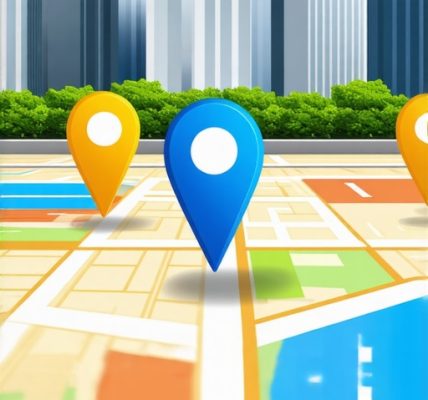Understanding the Importance of Google Maps SEO
In today’s digital landscape, mastering Google Maps SEO is essential for businesses looking to enhance their local visibility. With billions of searches conducted daily, optimizing your Google Business Profile can significantly impact your rankings and customer engagement. But what exactly is Google Maps SEO, and why is it crucial?
Google Maps SEO refers to the strategies and techniques aimed at improving your business’s visibility within Google Maps and local search results. As consumers increasingly rely on online searches to find local services and products, positioning your business correctly can lead to higher foot traffic, increased calls, and ultimately, more sales.
Key Strategies for Dominating Google Maps Rankings
To effectively boost your rankings on Google Maps, consider implementing the following strategies:
1. Optimize Your Google Business Profile
Your Google Business Profile is your digital storefront. Ensure all information, including your business name, address, phone number, and business hours, is accurate and up-to-date. Adding high-quality images and a compelling business description can also enhance your profile’s appeal.
2. Utilize Relevant Keywords
Incorporating relevant keywords into your business description and posts can significantly improve your visibility. Conduct thorough keyword research to identify terms that potential customers are using to find services like yours.
3. Encourage Customer Reviews
Positive customer reviews not only build credibility but also play a vital role in local search rankings. Implementing a strategy to generate customer reviews can significantly enhance your online reputation and influence potential customers. Responding to reviews, both positive and negative, demonstrates your commitment to customer satisfaction.
4. Leverage Local Citations
Consistent citations across various online directories can help improve your local SEO. Ensure your business information is consistent on platforms such as Yelp, Yellow Pages, and other local directories. This consistency boosts your credibility and helps search engines verify your business details.
5. Create Localized Content
Developing content tailored to your local audience can enhance your relevance in search results. Consider writing blog posts or guides that address local events, trends, or news relevant to your industry. This not only helps with SEO but also positions your business as a community leader.
Monitoring and Adjusting Your Strategies
Regularly monitoring your Google Maps performance through analytics can provide valuable insights into what’s working and what needs adjustment. Using tools like Google Analytics can help you track traffic and user behavior, allowing you to refine your strategies over time. Additionally, consider conducting a GMB SEO audit to identify areas for improvement.
In conclusion, implementing effective Google Maps SEO strategies is vital for businesses aiming to dominate local rankings. By optimizing your Google Business Profile, utilizing relevant keywords, encouraging customer reviews, leveraging local citations, and creating localized content, you can significantly enhance your visibility and attract more customers. Start today and watch your business thrive in local searches!
Utilizing Google Maps SEO to Maximize Local Engagement
To further enhance your local visibility, understanding the nuances of Google Maps SEO is critical. Beyond just optimizing your Google Business Profile, you should also focus on strategies that engage your local community. By employing effective techniques, you can create a direct link between your business and potential customers in your area.
6. Optimize for Voice Search
With the rise of voice-activated devices, optimizing your content for voice search can significantly improve your chances of appearing in local search results. People often use conversational phrases when speaking into their devices, so consider integrating these phrases into your website and Google Business Profile. This can include FAQs or common customer inquiries that reflect how locals might search for your services.
7. Use High-Quality Visual Content
Visual content can greatly influence customer decisions. Ensure to include high-quality images in your Google Business Profile that showcase your products, services, or even your team. A cohesive visual strategy not only makes your profile more appealing but also helps convey your brand’s personality.
8. Engage with Local Events and Sponsorships
Participating in local events or sponsoring community activities can enhance your business’s visibility. These engagements provide opportunities for local backlinks and mentions, which are beneficial for SEO. Additionally, they offer a chance to create localized content that resonates with your audience, promoting both your business and the community.
Building a Strong Local Link Profile
A strong link profile can boost your Google Maps SEO efforts significantly. Focus on acquiring backlinks from local websites, directories, and blogs. This can be achieved through guest blogging, collaborations, or simply by creating valuable content that others want to share.
9. Collaborate with Influencers
Identifying and partnering with local influencers can help you reach a broader audience. Influencers who resonate with your target market can create authentic content that showcases your business, driving traffic to your Google Business Profile and website. This not only enhances your online presence but also builds trust within the community.
10. Monitor and Respond to Online Mentions
Keeping track of what is being said about your business online is essential. Utilize tools to monitor mentions of your brand and engage with customers by responding to comments, whether they’re positive or negative. This proactive approach not only improves your reputation but also encourages customer loyalty.
Conclusion: The Road Ahead in Google Maps SEO
In summary, mastering Google Maps SEO involves a multifaceted approach that includes optimizing your profile, engaging with your local community, and building a solid online reputation. By implementing these strategies, such as optimizing for voice search and utilizing high-quality visuals, you can enhance your visibility and attract more customers. Start applying these techniques today, and watch your local business thrive in the competitive digital landscape.
Leverage Local SEO Techniques for Better Rankings
To maximize your Google Maps SEO efforts, it’s essential to leverage a variety of local SEO techniques. Local SEO focuses on optimizing your online presence to attract more business from relevant local searches. By implementing these strategies, you can improve your visibility not just on Google Maps but across the entire search landscape.
11. Optimize Your Google Business Profile for Local Keywords
Incorporating local keywords into your Google Business Profile is crucial for improving your local search rankings. Identify the search terms your potential customers are using, and integrate these keywords naturally into your business description, services, and posts. This will help Google understand what your business offers and match it with relevant local queries.
12. Encourage Customer Reviews and Respond to Feedback
Customer reviews play a significant role in local SEO. Encourage your satisfied customers to leave positive reviews on your Google Business Profile and other platforms. Responding to reviews, whether positive or negative, shows potential customers that you value feedback and are engaged with your clientele. This engagement can significantly enhance your online reputation and drive more traffic to your business.
13. Use Local Business Schema Markup
Implementing local business schema markup on your website helps search engines understand your business details better. This structured data can enhance your visibility in local search results by providing essential information like your business name, address, phone number, and opening hours directly in search results. Additionally, this can improve your chances of appearing in local packs and Google Maps results.
Creating Engaging Content for Local Audiences
Content creation is a powerful tool for local SEO. Developing engaging, localized content can help you connect with your community and improve your search visibility.
14. Write Blog Posts Targeting Local Events
Creating blog posts that focus on local events, news, or activities can attract local traffic to your site. This content not only showcases your business’s involvement in the community but also helps establish you as an authority in your area. Consider writing articles about upcoming events, local interviews, or even collaborations with other local businesses.
15. Utilize Social Media for Local Engagement
Social media platforms are excellent for promoting local content and engaging with your audience. Share your blog posts, customer reviews, and community involvement stories on platforms like Facebook and Instagram. Use local hashtags to increase your visibility and connect with potential customers in your area. This approach not only drives traffic to your Google Business Profile but also fosters community relationships.
Monitoring and Analyzing Your Google Maps Performance
To ensure your strategies are effective, it’s essential to monitor and analyze your performance regularly. Utilize tools such as Google Analytics and Google Search Console to track your progress.
16. Track Your Local Search Rankings
Monitoring your local search rankings allows you to see how well your optimization efforts are paying off. By tracking keywords relevant to your business and location, you can identify areas that need improvement. This information is vital for refining your SEO strategies and staying competitive in your local market.
17. Analyze Customer Interaction Metrics
Understanding how customers interact with your Google Business Profile can provide valuable insights into your performance. Pay attention to metrics such as views, clicks, and calls. This data can help you evaluate which aspects of your profile are working well and which may need adjustment. Regularly reviewing these metrics allows you to stay ahead of the competition and continue attracting local customers.
Utilizing Analytics to Refine Your Local SEO Strategy
Analytics play a vital role in optimizing your Google Maps SEO. By leveraging data, you can understand customer behavior and preferences, allowing you to tailor your strategies effectively.
18. Implement Google My Business Insights
Google My Business (GMB) offers valuable insights into how customers find and interact with your listing. Analyzing metrics such as search queries, customer actions, and popular times can provide a clearer picture of your audience. Use this data to refine your SEO tactics and enhance your local search performance.
19. Set Up Conversion Tracking
Establishing conversion tracking on your website can help you determine the effectiveness of your GMB listing and online marketing efforts. By tracking actions such as website visits, calls, and appointments, you can measure the return on investment (ROI) of your local SEO strategies. This data is key to making informed decisions and adjustments to your campaigns.
Staying Ahead with Local SEO Trends
Local SEO is constantly evolving, and staying updated with the latest trends ensures your strategies remain effective in a competitive landscape.
20. Embrace Voice Search Optimization
With the rise of voice-activated devices, optimizing for voice search is becoming essential. Consider how people phrase their inquiries when speaking versus typing. Incorporate natural language and long-tail keywords into your content to capture voice search traffic. This approach not only broadens your audience but also aligns with the growing trend of local voice queries.
21. Focus on Mobile Optimization
As mobile searches continue to dominate, ensuring your website is mobile-friendly is crucial for your local SEO success. A responsive design enhances user experience, reducing bounce rates and increasing engagement. Google prioritizes mobile-friendly sites in its rankings, making this aspect a non-negotiable part of your SEO strategy. For more insights on optimizing your website, check out How to Optimize Your Google Business Listing Effectively.
Building Local Authority through Community Engagement
Establishing your business as a community authority can significantly boost your local SEO efforts.
22. Participate in Local Sponsorships and Events
Getting involved in local events or sponsoring community activities can enhance your visibility and credibility. By associating your brand with local initiatives, you create positive associations and attract more local customers. Document these engagements on your Google Business Profile and social media to showcase your commitment to the community.
23. Network with Local Influencers
Collaborating with local influencers can amplify your reach and credibility. Consider reaching out to influential figures in your area who align with your brand values. Their endorsement can introduce your business to a broader audience and enhance your local search presence.
Conclusion: A Holistic Approach to Local SEO
Combining various strategies, from optimizing your Google Business Profile to engaging with your community, is essential for effective local SEO. By continually refining your approach, monitoring performance, and staying updated on trends, you can significantly enhance your local visibility and drive more business. For a comprehensive guide on mastering local SEO, visit Mastering Google Business SEO: Your Complete Guide.
Frequently Asked Questions About Local SEO
1. What is Local SEO and why is it important?
Local SEO refers to the optimization of your online presence to attract more business from relevant local searches. It is crucial because it helps businesses promote their products and services to local customers at the exact time they’re looking for them.
2. How can I optimize my Google Business Profile?
To optimize your Google Business Profile, ensure your listing is complete with accurate information, high-quality images, and engaging descriptions. Regularly update your profile, respond to reviews, and utilize posts to keep your audience informed.
3. What role do reviews play in Local SEO?
Reviews are a significant ranking factor in local SEO. Positive reviews can enhance your credibility and attract more customers, while also influencing your position in local search results. Encourage satisfied customers to leave reviews on your Google Business Profile.
4. How often should I update my Google Business Profile?
It’s recommended to update your Google Business Profile regularly, especially when you have new offers, events, or changes in hours. Frequent updates signal to Google that your business is active, which can improve your ranking.
5. What are local citations and how do they impact SEO?
Local citations are mentions of your business name, address, and phone number (NAP) on other websites. They are essential for local SEO as they help improve your business’s visibility and credibility in local search results.
6. How can I track my Local SEO performance?
You can track your Local SEO performance using various tools such as Google Analytics, Google My Business Insights, and third-party SEO tools. These tools help you monitor traffic, conversions, and user engagement metrics.
7. Is mobile optimization necessary for Local SEO?
Yes, mobile optimization is critical for Local SEO. With the majority of local searches occurring on mobile devices, having a mobile-friendly site ensures a better user experience and can positively impact your search rankings.
8. What are the best practices for local link building?
Best practices for local link building include engaging with local businesses, participating in community events, sponsoring local organizations, and creating valuable content that earns you backlinks from local websites.
9. How does social media impact Local SEO?
Social media can influence Local SEO by driving traffic to your website, enhancing your online presence, and helping you engage with your community. Active social media profiles can indirectly boost your local search rankings.
10. How can I leverage local keywords for better SEO?
To leverage local keywords, incorporate them naturally into your website content, meta descriptions, and blog posts. Use tools like Google Keyword Planner to identify relevant local search terms that your audience is using.
Authority Resources for Local SEO
To stay informed and enhance your Local SEO skills, consider exploring the following trusted resources:
- Moz’s Local SEO Guide – A comprehensive resource for understanding local SEO fundamentals.
- Search Engine Journal – Local SEO Section – Offers the latest news and best practices in local search marketing.
- Neil Patel’s Local SEO Guide – Detailed strategies and insights on optimizing for local search.
- BrightLocal Learning Hub – Provides resources and tools for local SEO success.
- Search Engine Watch – Offers articles and updates on various aspects of SEO, including local strategies.
Conclusion: Your Path to Local SEO Mastery
Effective local SEO requires a well-rounded approach that encompasses optimizing your Google Business Profile, engaging with your community, and staying updated with industry trends. By implementing the strategies outlined in this guide and continually refining your approach, you will enhance your local visibility and drive more business. Remember, mastering local SEO is not just about rankings; it’s about connecting with your community and providing value to your customers. For further guidance, explore our recommended resources and take your local SEO efforts to the next level.





The emphasis on optimizing the Google Business Profile as the digital storefront really resonates with me. In my experience managing a local bookstore, accurately maintaining business hours and contact info was crucial, but it was the addition of engaging photos and incorporating localized keywords in the description that noticeably boosted our visibility. One challenge I faced, however, was encouraging customers to leave reviews organically without feeling pushy. I found that hosting community events and following up with attendees via social media gently prompted feedback and helped build a steady stream of authentic reviews. I’m curious how others have balanced active review generation with maintaining a natural customer experience? Also, the idea of leveraging localized content like blog posts about neighborhood happenings strikes me as a great way to deepen community ties while supporting SEO efforts. Does anyone have recommendations on how frequently to publish such local content without overwhelming the audience?
Reading this comprehensive guide really underscores how crucial consistency and community engagement are to local SEO success. From my own experience managing a small café, I found that regularly updating our Google Business Profile with fresh images and posts about local events brought more foot traffic. What I noticed was that responding to reviews genuinely and quickly noticeably improved our online reputation, which in turn, boosted our local rankings. I’ve often wondered, how do other small business owners find the right balance between promoting their services and seeming overly promotional? I agree with Melissa’s point on branding the business as a community hub — we started sponsoring local charity runs and it really gave us valuable backlinks and goodwill. It’s interesting that she mentioned blog posts about neighborhood happenings; I’ve found that a post once every few weeks keeps the content fresh without overwhelming our audience. Do you think that frequency varies depending on the industry or region? Would love to hear others’ strategies on maintaining engagement through content.